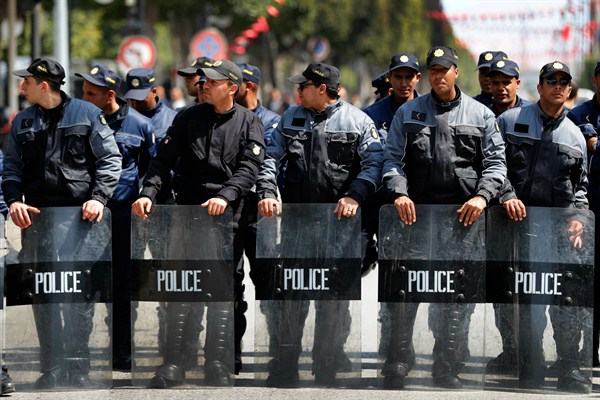Tunisia is often considered a success story compared to other Arab countries caught up in the popular uprisings of 2011. Unlike Syria and Libya, it has been spared armed conflict. And unlike Egypt, which is descending deeper into authoritarianism, it has implemented impressive democratic reforms.
Yet such comparisons risk overlooking the many ways in which Tunisia is still fragile eight years after protests toppled longtime President Zine El Abidine Ben Ali. As Francisco Serrano notes in this week’s in-depth report for WPR, the security forces are struggling to counter the threat posed by Islamist extremists based near the border with Algeria. The economy, badly in need of widespread reforms, is failing to accommodate young job-seekers. And the political landscape is fractured by tensions between secular and Islamist parties and their supporters.
Serrano recently traveled to the capital, Tunis, and to areas of western Tunisia where jihadist groups are entrenched in remote mountain ranges. In this week’s interview episode of the podcast, he talks with WPR’s senior editor, Robbie Corey-Boulet, about the roots of all these problems, whether Tunisia’s leaders can find solutions, and how they might be affected by the results of elections planned for later this year.
If you like what you hear on Trend Lines and what you’ve read on WPR, you can sign up for our free newsletter to get our uncompromising analysis delivered straight to your inbox. The newsletter offers a free preview article every day of the week, plus three more complimentary articles in our weekly roundup every Friday. Sign up here. Then subscribe.
Listen:
Download: MP3
Subscribe: iTunes | RSS | Spotify
Relevant Articles on WPR:
Is Tunisia’s Post-Arab Spring ‘Success Story’ Only Skin-Deep?
Trend Lines is produced and edited by Peter Dörrie, a freelance journalist and analyst focusing on security and resource politics in Africa. You can follow him on Twitter at @peterdoerrie.
To send feedback or questions, email us at podcast@worldpoliticsreview.com.

